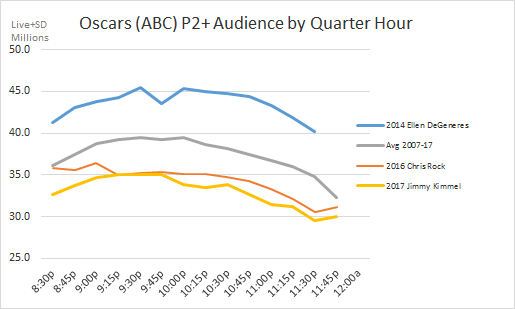The Oscars on Sunday 2.26.2017 averaged 32.9 million live+same day, according to Nielsen, close to the 34.4 million last year but down significantly from 37.3 million in 2015 and 43.6 million in 2014. Click here for a complete track for the past decade of Oscar telecasts.
Looking at the quarter hour ratings for the telecast, 2017 had the same basic pattern as usual, building from 8:30 to 10:00 pm ET and then drifting down steadily through the conclusion. 10:00 pm ET is important as that is about the time each year the Best Supporting Actress award hits and roughly an hour passes without any marque awards most years. This year, Best Supporting Actress was followed by eight awards with very limited audience appeal (Foreign Language Film, Animated Short Film, Animated Feature Film, Production Design, Visual Effects, Film Editing, Live Action Short Film and Documentary Short Subject) before returning to Cinematography, Score, Song, the writing awards and of course the Big Four: Directing, Actor, Actress and Best Picture. But by then, the show is battling sleep and declining television usage levels in the 75% of the country in the Eastern and Central Time Zones after 11:00 pm ET and especially 11:30 pm ET.
2014 hosted by Ellen DeGeneres remains the recent gold standard for The Oscars. That show was not immune to the challenge of the show’s rundown, but it started and ended at levels about five million viewers above the average for the past decade. In contrast, 2017 followed a track very similar to 2016, consistently about 5 million viewers below the past decade average in each segment.
###
Related Posts
-
OSCARS Quarter Hour Ratings: A Decent Start But No Momentum
The Oscars telecast on Sunday 2.28.2016 started right on par with recent telecasts, just above 35 million viewers for both 2016 and the average of every telecast since 2007. Generally speaking, the average Oscar show audience rises through the first hour, then holds steady until about 10:00 or 10:15 pm…
-
The Oscars Ratings: Past 10 Years (Updated with Official Nationals)
UPDATE: In the official live+same day nationals for Sunday 2.26.2017, The Oscars averaged a 9.1 18-49 rating and 32.9 million viewers 2+, a modest +6% lift from the fast nationals. That is a record low 18-49 rating, and the total viewer counts managed to stay slightly above the 2008 low, thanks mostly…
-
UPDATED With Oscar Finals: SHOWBUZZDAILY SUNDAY NETWORK SCORECARD – 2.26.2017
OSCAR FINALS: The accelerated final ratings for the Oscar telecast have been released, and the 18-49 rating climbed only to 9.1, a record-setting low (and an ugly 1.4 lower than 2016). There were 32.9M total viewers, which just managed to dodge 2008’s record low of 32M. We’ll see…
-
WEDNESDAY Ratings
Preliminary ratings are delayed by Nielsen until at least 9:30 am PT (90 minutes past due). The ratings service is performing extra “quality checks,” so be prepared for unusually high quality ratings later this morning!





